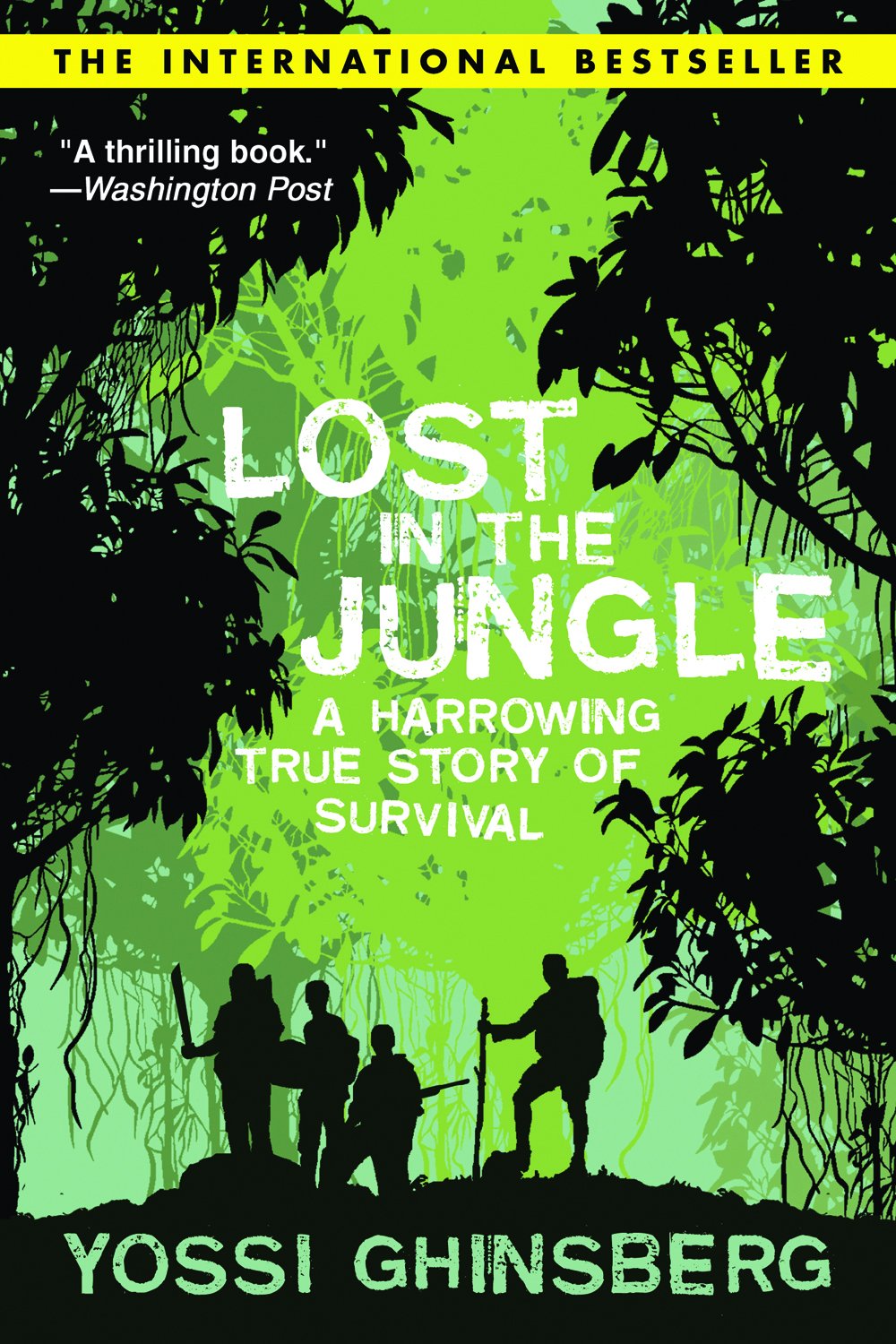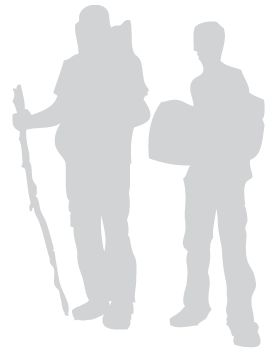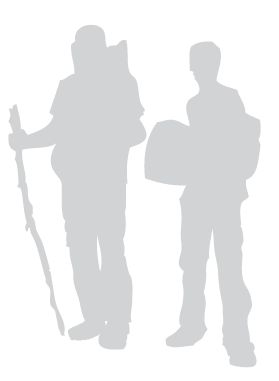Lost in the Jungle
Read Lost in the Jungle Online
Authors: Yossi Ghinsberg

A Harrowing True Story of Adventure and Survival
Yossi Ghinsberg
Copyright © 2009 by Yossi Ghinsberg
All Rights Reserved. No part of this book may be reproduced in any manner without the express written consent of the publisher, except in the case of brief excerpts in critical reviews or articles. All inquiries should be addressed to Skyhorse Publishing, 555 Eighth Avenue, Suite 903, New York, NY 10018.
Skyhorse Publishing books may be purchased in bulk at special discounts for sales promotion, corporate gifts, fund-raising, or educational purposes. Special editions can also be created to specifications. For details, contact the Special Sales Department, Skyhorse Publishing, 555 Eighth Avenue, Suite 903, New York, NY 10018 or info
@
skyhorsepublishing.com.
10 9 8 7 6 5 4 3 2 1
9781602393707
Printed in the United States of America
For Marcus
Queste? Queste? – Helaqui! Helaqui!
(Where is it? Where is it? – It is here! It is here!)
Vesty Pakos
Copyright Page
Dedication
ACKNOWLEDGMENTS
LOST IN THE JUNGLE
Chapter one
-
MEETING MARCUS
Chapter two
-
THE MOCHILEROS
Chapter three
-
KARL AND KEVIN
Chapter four
-
CANADIAN PETE
Chapter five
-
GOLD AND PIGS
Chapter six
-
BACK TO ASRIAMAS
Chapter seven
-
SHOOTING WHITE WATER
Chapter eight
-
THE ACCIDENT
Chapter nine
-
ALONE
Chapter ten
-
‘I’M ON MY WAY TO SAN JOSÉ’
Chapter eleven
-
RESCUE
Chapter twelve
-
KEVIN’S TALE
Chapter thirteen
-
GOING HOME
EPILOGUE
a note from the author
-
UNCHARTED DOMAINS

I am filled with gratitude for life itself – if I’ve learned nothing else from the following story, I’ve learned that the gift of life is not to be taken for granted. Nothing is mundane; it is all a miracle.
With that said, it must be sweet serendipity that brought my gorgeous wife into my life. Thank you, my Bella Belinda, for beautifying my environments, for being my first mirror projecting such a loving image of myself, and for the world of beauty that is in you, the beholder. I love you.
Thank you, my three daughters, Mia, Cayam and Nissim who teach me unconditional love, unshakable trust, and total acceptance. I am constantly overwhelmed by your grace. You bring deeper meaning to my existence, and through you, evolution makes sense.
To my parents: from you I learned that being a happy old person is the purpose of life, for our last moments colour it all. I pay respect to you, for my debt will never be paid.
My brother Moshe and his wife Miri are my heroes whom I look to for inspiration. Their compassion is intrinsic, and service is their way of life. Such fine specimens of humanity are indeed rare to find.
It is said that each one of us is personally assigned a guardian angel. Well mine has been exposed. He goes by the name of Ron Fremder, and a real angel he is.
‘When a student is ready, the teacher will appear’ was just an adage until you manifested in my life, Rohm Kest, my sensei. Your teachings have transformed me – I bow to you every day. To Bharat Mitra, my friend and partner, you are a living inspiration to me – it must be my good karma to have met you.
I am a fortunate man of many assets, and these are my friends. Like solid rocks in calm and rough waters, in them I rejoice and find respite. I love you all. You are my tribe.

MEETING MARCUS
If I had never fallen in with Marcus in Puno, I might never have met Kevin or crossed paths with Karl. If I hadn’t met Karl that morning in La Paz, Kevin might well have spent Christmas with his family, and poor old Marcus might still be wandering South America with his girl. But that’s not the way things happened.
When I arrived in the Peruvian town of Puno, my knee was hurting badly; walking was terribly painful. A French
mochilero
(backpacker) offered me coca leaves to chew.
‘Have a little of this,’ he said. ‘You’ll feel better.’
I put a pinch of leaves in my mouth and chewed on the strange little rock, another gift from the Frenchman. The rock, made of pressed liana ashes, extracts the active alkaloids from the leaves and causes them to ferment in the mouth. Without the rock there’s no fermentation, no effect, no high.
All it did was put my tongue and the roof of my mouth to sleep.
I rose early the next morning feeling better nevertheless. The boat to the island of Taquile would be leaving at eight o’clock. The truth is, I could have headed straight to Cuzco, where all the
mochileros
start out on their trips to the legendary city of Machu Picchu, the ancient Inca capital, but I preferred to make a brief detour and visit the storied island.
Taquile rises out of Lake Titicaca, the highest navigable lake in the world. The shores of the lake were filthy, but when one looked out toward the horizon, the water was shimmering. Mountainous islands peeked through the mist that blanketed the lake. It was a beautiful sight.
I had no difficulty finding the ferry. In effect, it found me.
‘Taquile or Los Uros?’ a small boy asked me.
‘Taquile,’ I answered.
He led me to a boat on which a few people were already waiting : a few young Germans and a group of French youths, who were staying at the same hotel as I was. I took a seat close to the stern and read a book.
Soon it was time to start. The pilot, an Indian, stuck out a long pole, which he used as both rudder and oar, and gestured to the boy to cast off the rope securing the nose of the boat and push us away from the dock.
‘Espera, espera
[wait]!’ a
mochilero
running, panting, cried breathlessly, and climbed down into the boat. ‘I almost missed it,’ he said to the Indian in Spanish, ‘
gracias
.’
He sat beside me, and as I moved to make room for him, he smiled at me. ‘You’re Israeli,’ he said in English.
I looked down at the book I was reading, Albert Camus’s
A Happy Death
in an English translation. I was astonished. ‘How could you tell?’
‘I knew right off. You Israelis have taken to the roads in droves.’
‘My name’s Yossi,’ I said.
‘Nice to meet you. I’m Marcus. I came here straight from the train station. Lucky for me I caught the boat. I would have had to wait a whole day for the next one.’
Marcus went on talking as if we were old friends. ‘The train was the pits. I left Juliaca early this morning. It’s impossible to get anything to eat on that train. I haven’t had a bite. I hope we get to the island fast. I’m starving.’
I pulled a roll, some cheese, and an orange out of my pack and offered them to him.
‘Thanks,’ Marcus said. ‘I’ve noticed Israelis always share whatever they have. I appreciate it.’
He made himself a sandwich of the roll and cheese and ate hungrily. The orange was his dessert.
‘I’ll pay you back when we get to the island.’
‘Forget it,’ I told him. ‘I’ve heard things are expensive in Taquile. If it’s all right with you, we could stay together tonight and share our food.’
‘I’m in.’
Marcus turned to the Germans and had a lively conversation with them in their language. Then he turned to the French group and spoke French with them. He had a compelling personality, and in no time we were all acquainted, talking and joking like him.
‘Are you German?’ I asked him.
‘Swiss,’ he replied.
We were almost to the island when the boat broke down. The engine just went dead. The boatman quickly located the trouble, and before long he had the engine running again. Marcus noticed that he had injured his finger during the repair, however, and whipped a first-aid kit out of his pack. He disinfected the Indian’s finger and asked me to cut a strip of adhesive tape. But, no, my efforts weren’t precise enough. He took the roll himself and cut a neater strip – just so – then went back to his bandaging. The man thanked him with a wide smile.
Moments later we were in Taquile. From the dock we climbed up toward the village along a steep path cut into solid rock. The higher we went, the more my lungs fought for air. I climbed two steps and stopped. Climbed and stopped.
‘Take it easy,’ Marcus encouraged me. ‘We’re in no hurry.’
‘And what about you?’ I asked.
‘Ah, Swiss Alps,’ he said with a smile. ‘I was in the services over there.’
We found ourselves a room in the village, with mud walls and a wooden platform for a bed. We spread our sleeping bags out and prepared a meal. Marcus made coffee on a small kerosene burner he carried; I split the rolls and carefully assembled cheese, onion, and tomato sandwiches. Although we had only just met and despite the fact that I had plans of my own, Marcus started planning a trip we might take together.
‘I haven’t seen Machu Picchu yet,’ I explained, ‘so I’ll be heading back to Cuzco.’
‘No, no, come along with me to La Paz,’ he urged.
‘Machu Picchu,’ I said, ‘and then I’m planning to cut across Brazil. I’ve been thinking about leaving from Puerto Maldonado, not far from Cuzco, by way of the Madre de Dios River; it cuts through Peru and runs into the Amazon.’
From there my plan called for me to follow the Amazon to its mouth near Belém on the Atlantic coast. I traced the route on the map. ‘There are a lot of interesting little villages on the way, and anyway I love the jungle. Why don’t you come along with me?’
‘Thanks for offering. It sounds like a great plan, a real adventure, but I’m at the end of this trip. I’ll spend some time in La Paz, maybe take a few side trips, maybe buy up some handmade vests to ship back to Switzerland, but nothing very ambitious.’
We found Taquile different from other Peruvian villages, and it was easy to tell a Taquile islander from a Peruvian Indian. The island people seemed nobler, cleaner, handsomer, healthier. They dressed differently too. They all wore the same hat, the same
chaleco
(embroidered vest), and broad trousers with an embroidered belt. The embroidery of Taquile is known all over Latin America for its beauty and fine quality, and it’s done exclusively by the men, though the women spin and dye the wool.
The island is a kind of commune of about fifty families managed by a community council. Life is tranquil. The men sit about doing their embroidery and gossiping, while the women toil in the fields. The rocky soil is difficult to cultivate and nothing grows there except potatoes. In the village itself are a small grocery and two or three restaurants. In one of them Marcus and I met the French group from the boat.
There were five of them, three girls – Dede, Annick, and Jacqueline – and two boys – Jacques and Michel. We drank the local
maté
(herb tea; there are many varieties served all over Latin America) and chatted. They preferred speaking French, and I didn’t understand a word, but Dede smiled at me, and I smiled back. She was on the plump side with a pretty face and short hair that gave her a mischievous look. She smiled again, and I asked her to come sit by me and began speaking English with her.
The dinner was delicious: coarse bread, two eggs apiece, and fried potatoes. For dessert another cup of
maté
; the natives think it alleviates the effects of high altitude. Then home. A
mochilero
changes beds almost every night, but every place he rolls his sleeping bag open is home.
Marcus and I went back to our room. He unpacked his
charango
(a small musical instrument like a mandolin but made from armadillo shell and wood) and strummed it. Marcus was a wonderful player, and I listened, enchanted.
‘Now listen to this, Yossi,’ he said. ‘It’s one I wrote for a girl I was in love with. Her name was Monica. She was mine for nine years, and now she’s left me.’
‘Far, far from my heart...’ he started to sing sadly.
I had known Marcus only a short time, and already he was sharing his most intimate secrets with me. Monica had been the love of his life. When they met, she was fourteen; he was five years older. Almost ten years had passed since then. Marcus became a schoolteacher; Monica, an academic. She thought his horizons too narrow and challenged him to broaden himself, to travel, so he went to South America. But out of sight, out of mind. With Marcus gone, she had fallen for another. The song was so doleful, pouring out of a thoroughly broken heart, that I myself grew sad.
We spent the day in Taquile together with the Frenchwomen: me with the smiling Dede, Marcus with Annick. Then we all took the boat back to Puno.
Lake Titicaca was stormy, and we had to take cover on the Uros, drifting ‘islands’ of
totora
reeds (Thor Heyerdahl built his vessel
Ra
from such reeds). We finally made it to Puno, soaking wet, but in high spirits.
In Puno I went back to my old hotel, and Marcus moved in with me. Again he brewed tea on his kerosene burner.
‘So what do you say, Yossi? Are you really leaving for Cuzco tomorrow?’ he asked.
‘Yes,’ I said. ‘I’ve already got the schedule for the morning train.’
‘I don’t get you,’ he argued. ‘Why not come along to La Paz, just for a week, and then you can come back to Peru?’
‘I would like to come along, I really would,’ I said, ‘but I can’t change my plans. I don’t want to miss Machu Picchu, and I don’t have enough money to do both.’
Marcus wouldn’t give in. ‘Look, Yossi. You shared food with me before you even knew me. Now let me treat you to a visit to La Paz.’ He stuck two fingers into the hem of his pants leg, pulled a few bills out, and held thirty dollars up to me. ‘Please, take the money, Yossi. It means nothing to me. It will only be worth something if you use it to come along.’
‘I couldn’t take it, Marcus,’ I answered, embarrassed. ‘I appreciate it. I do. But you have nothing but the pack on your back, the same as me, and there’s no reason in the world why I should take your money.’
Marcus began reciting a poem. I don’t remember the title or the poet’s name, but I’ll never forget its content or the way he recited it. It was about a man who never wanted to take anything from anyone and never learned how to give.
The next morning we were all on the bus to La Paz – Marcus and me and the five French
mochileros
.